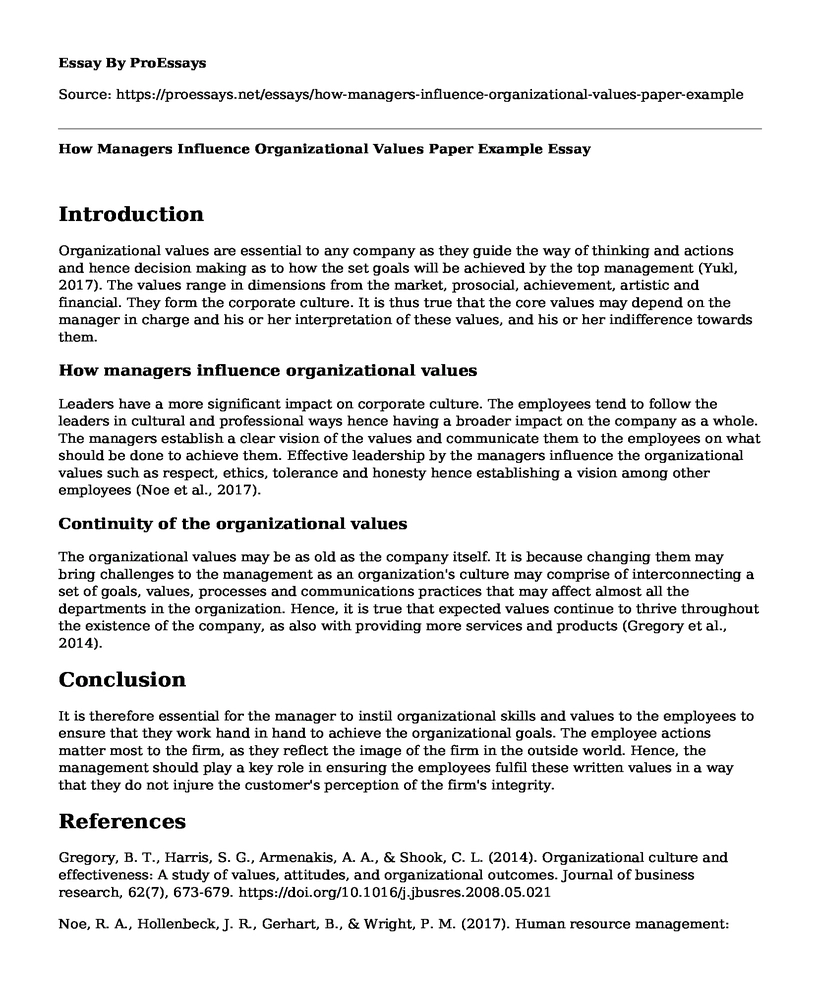Introduction
Organizational values are essential to any company as they guide the way of thinking and actions and hence decision making as to how the set goals will be achieved by the top management (Yukl, 2017). The values range in dimensions from the market, prosocial, achievement, artistic and financial. They form the corporate culture. It is thus true that the core values may depend on the manager in charge and his or her interpretation of these values, and his or her indifference towards them.
How managers influence organizational values
Leaders have a more significant impact on corporate culture. The employees tend to follow the leaders in cultural and professional ways hence having a broader impact on the company as a whole. The managers establish a clear vision of the values and communicate them to the employees on what should be done to achieve them. Effective leadership by the managers influence the organizational values such as respect, ethics, tolerance and honesty hence establishing a vision among other employees (Noe et al., 2017).
Continuity of the organizational values
The organizational values may be as old as the company itself. It is because changing them may bring challenges to the management as an organization's culture may comprise of interconnecting a set of goals, values, processes and communications practices that may affect almost all the departments in the organization. Hence, it is true that expected values continue to thrive throughout the existence of the company, as also with providing more services and products (Gregory et al., 2014).
Conclusion
It is therefore essential for the manager to instil organizational skills and values to the employees to ensure that they work hand in hand to achieve the organizational goals. The employee actions matter most to the firm, as they reflect the image of the firm in the outside world. Hence, the management should play a key role in ensuring the employees fulfil these written values in a way that they do not injure the customer's perception of the firm's integrity.
References
Gregory, B. T., Harris, S. G., Armenakis, A. A., & Shook, C. L. (2014). Organizational culture and effectiveness: A study of values, attitudes, and organizational outcomes. Journal of business research, 62(7), 673-679. https://doi.org/10.1016/j.jbusres.2008.05.021
Noe, R. A., Hollenbeck, J. R., Gerhart, B., & Wright, P. M. (2017). Human resource management: Gaining a competitive advantage. New York, NY: McGraw-Hill Education. Retried from https://www.researchgate.net/profile/Ariadne_Tsambani/post/What_would_be_the_best_approach_to_support_leaders_in_processes_of_change_and_organizational_development_through_eLearning/attachment/59d6341579197b8077991c40/AS%3A377864680689667%401467101368871/download/51.pdf
Yukl, G. (2017). How leaders influence organizational effectiveness. The leadership quarterly, 19(6), 708-722. https://doi.org/10.1016/j.leaqua.2008.09.008
Cite this page
How Managers Influence Organizational Values Paper Example. (2022, Dec 06). Retrieved from https://proessays.net/essays/how-managers-influence-organizational-values-paper-example
If you are the original author of this essay and no longer wish to have it published on the ProEssays website, please click below to request its removal:
- Personal Leadership Paper
- General Electric Company Case Study Paper Example
- Roles and Responsibilities of Project Work Groups and Teams Paper Example
- Leadership and Management in Nursing E-Portfolio
- Essay on MNCs Reinventing Through Strategic Change: Amazon, Nokia, Coca-Cola, Toyota
- Essay on Maximizing Impact: Koe Koe Tech Develops Sustainable Goals for Social Entrepreneurship
- Report Sample on Difference Between Product & Project







